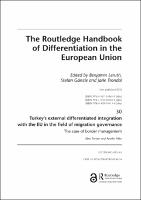Chapter 30 Turkey’s external differentiated integration with the EU in the field of migration governance
Proposal review
The case of border management
Abstract
This chapter investigates and unravels the extent and drivers of Turkey’s external differentiated integration with the EU in the field of border management. While Turkey’s EU accession negotiations remain in a state of coma, there is a continuing need for policy convergence and alignment in areas of common interest such as migration governance. With a view to combat irregular migration, the EU has placed the export of its border management norms and rules at the center of its dialogue with Turkey. Thus, EU–Turkey relations in the field of border management represent an appealing case to study policy convergence between the EU and Turkey outside the accession scheme and examine the ever-evolving phenomena of external differentiated integration from both policy-centered and theory-directed angles. The chapter first conceptualizes external differentiated integration and introduces the five explanatory factors that have been recurrently used by the literature to explain the variance in (external) differentiation: politicization, extent of mutual interdependence, asymmetry of interdependence, incentives, and domestic conditions. It then critically assesses the effect of these prevailing drivers of differentiation on the three central issue areas concerning EU–Turkey dialogue on border regime: the implementation of the Integrated Border Management (IBM), Turkey’s operational cooperation with FRONTEX, and the March 2016 EU–Turkey Statement.


 Download
Download